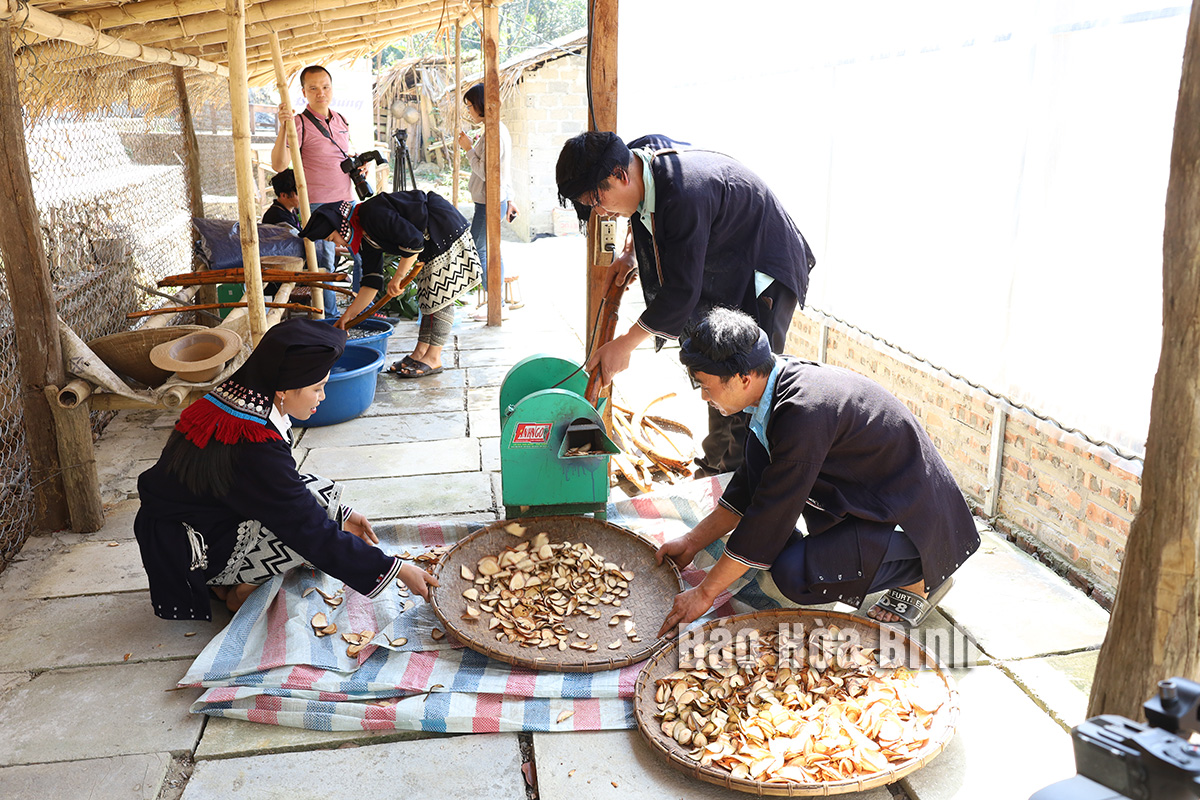
Boasting stunning landscapes, and standout cultural traits, many localities across Hoa Binh province have developed unique offerings to bolster rural tourism.
Activities of the herbal medicine production group in Sung village, Cao Son commune, Da Bac district have been an attractive tourism offering for visitors.
A wide range of new offerings have been developed in Sung village in Cao Son commune, Da Bac district, renowned for its untouched landscapes, and excellent cultural practice and customs of the Dao ethnic people, with the support of a non-governmental organisation.
The village set up brocade weaving groups, and herbal medicine and "do” paper production teams to serve visitors.
According to Ly Thi Nhat from a brocade weaving group, the establishment of the groups help locals introduce their products to visitors and create new tourism products to improve their livelihoods sustainably. She said herbal massage balms, mosquito repellent sprays, and brocade bags, among others, have been favoured by many tourists.
Meanwhile, Ngoi village in Suoi Hoa commune, Tan Lac district, inhabited by the Muong ethnic people, has branched out its community-based tourism, attracting visitors from far and wide to experience local food, caged fish farming, and experience net fishing.
Hoa Binh is now home to more than 20 community-based tourism hamlets and villages, five of which have been recognised as three or four-star OCOP products. Many farms have provided lodging and experiential service for visitors, including An Lac Eco Farm Hot and Springs in Kim Boi district, and Happy Farm in Luong Son district. Furthermore, various agro-cultural tours have been set up in craft villages across the province.
Deputy Director of the provincial Department of Culture, Sports and Tourism Bui Xuan Truong said the province has accelerated its rural tourism development programme in recent years, with many high-quality offerings having launched to serve tourists.
However, the province has countered many challenges while carrying out the scheme such as inharmonious development of rural tourism infrastructure, and limited connectivity among tourism activities in many areas.
In the coming time, the province will provide resource support for rural tourism, with a focus on the training of the labour force, promotion of digital transformation, and enhancement of inter-sectoral coordination, and international cooperation in the area, while developing more OCOP products, and shaping up a value chain that engage experience tourism and eco-tourism, he added.
The People’s Committee of Tan Lac district recently hosted a cultural, sports and tourism festival of local highland communes and a ceremony to receive the Heritage Tree designation.
Hien Luong commune in Da Bac district is blessed with beautiful landscapes, thanks to its location besides a vast, picturesque reservoir with clear waters year-round. This natural advantage has allowed the local ethnic minorities to develop sustainable tourism, becoming a community tourism destination.
The 2024 Tour Guide Competition was held in the framework of the Hoa Binh Provincial Culture and Tourism Week, bringing together 13 contestants from seven districts and cities to celebrate the vital role of tour guides as cultural ambassadors.
Nature has generously endowed Hien Luong Commune (Da Bac district) with many beautiful landscapes, including the vast and poetic lake area, with clear blue water all year round. These conditions are favorable for the ethnic minority communities here to develop a sustainable economy and establish community tourism destinations.



